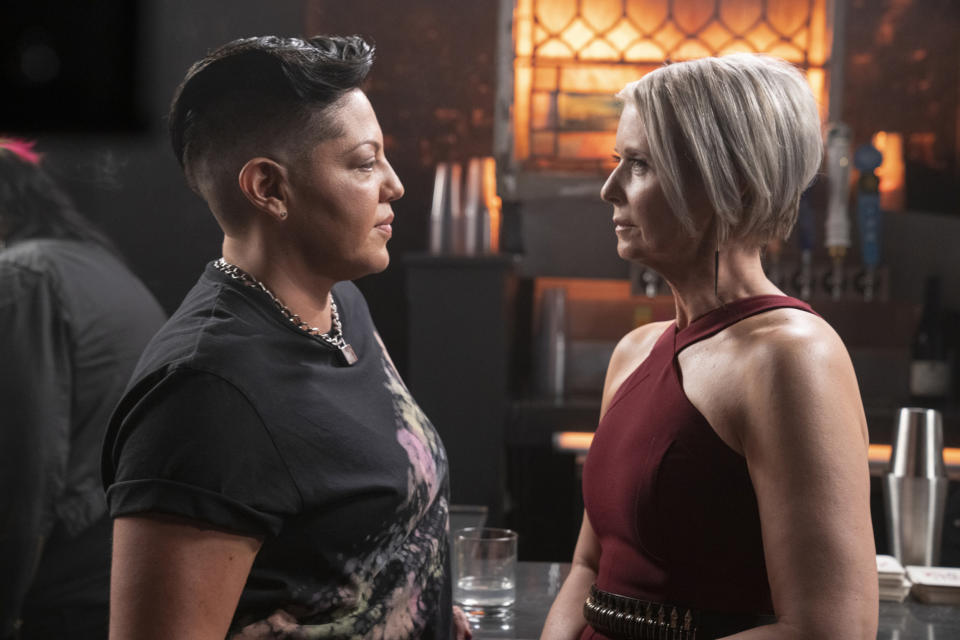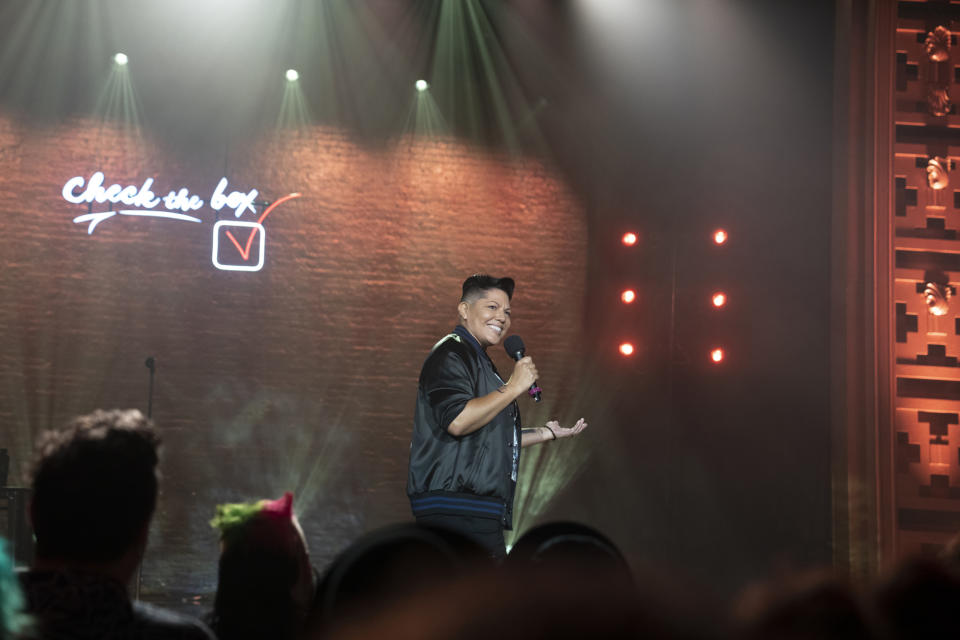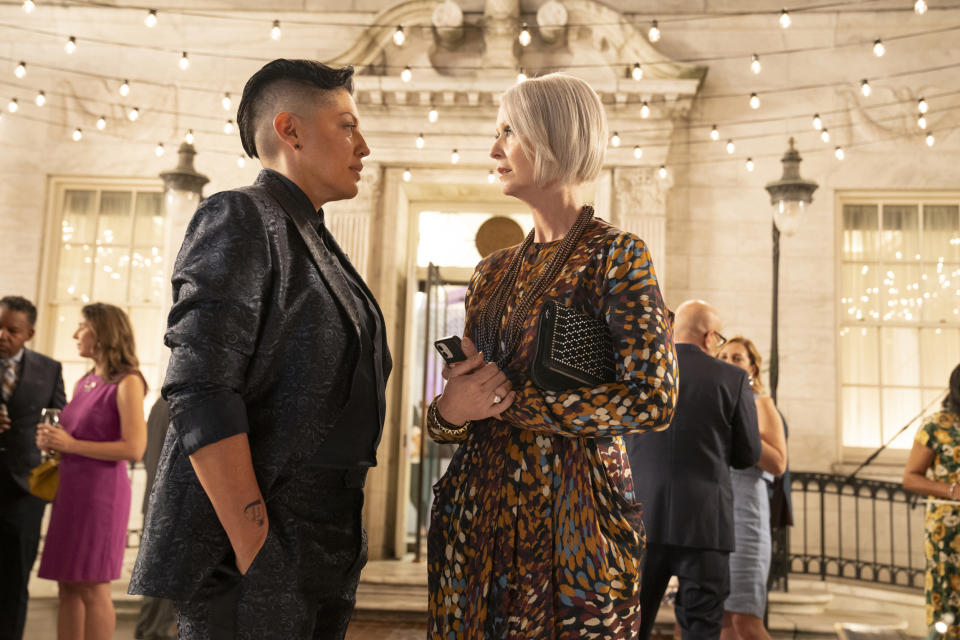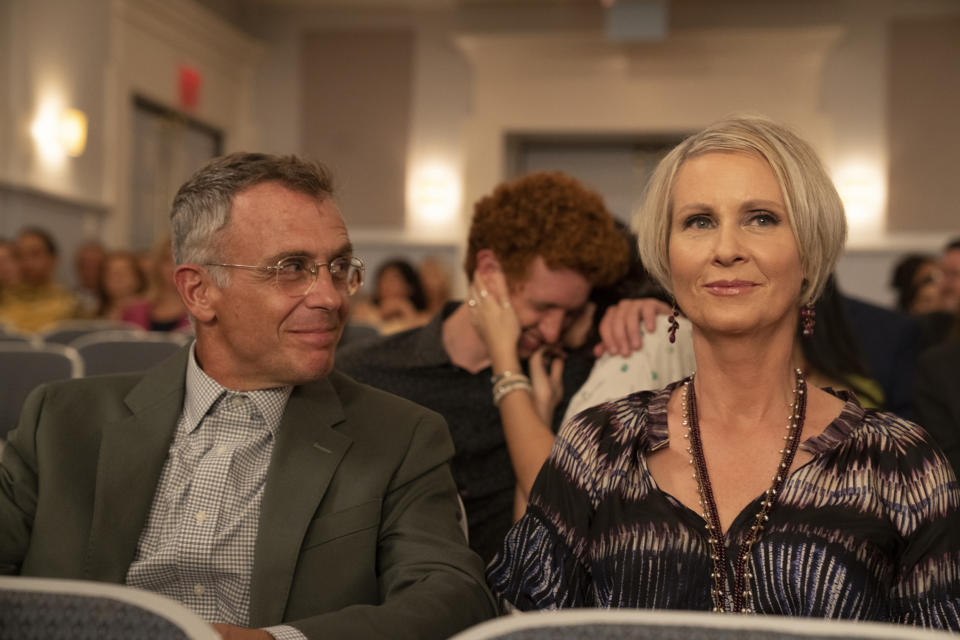The agony and ecstasy of Miranda’s coming out in the ‘Sex and the City’ reboot
- Oops!Something went wrong.Please try again later.
- Oops!Something went wrong.Please try again later.
Love it or hate it, “And Just Like That…” has kept fans tuning in week after week with its often cringe-worthy moments and its nostalgic appeal. But one plot line in particular has been the focus of headlines and heated debate, which recently reached a crescendo: Miranda Hobbes' roller-coaster ride of a coming-out story.
Since the premiere of the "Sex and the City" reboot, there have been plenty of hints that Miranda (Cynthia Nixon) wouldn’t end the season in a heterosexual relationship. Everyone’s favorite redhead, now sporting a sensible gray bob, is practically drooling when she swaps flirtatious jabs with Che Diaz, a nonbinary podcast personality played by Sara Ramirez, in episode two. And every time the two bump into each other, Miranda’s interest deepens. But her infatuation is met with a fair amount of bewilderment and eye-rolling from Carrie Bradshaw (Sarah Jessica Parker) and Charlotte York (Kristin Davis). After all, Miranda is still married to Steve Brady (David Eigenberg), the lovable bartender from Queens who won her heart with his everyman’s appeal.

Miranda’s interest in Che isn’t the only thing earning her side glances in the season’s early episodes. She’s also developed an unflattering combination of alcoholism and a tendency to say the wrong thing. It’s an unexpected turn for the friend who was always the most level-headed but is now bungling her way through everything from a funeral to a graduate-school class. In the first few episodes, her booze-fueled “woke” rants make for some of the more difficult-to-watch moments — though, that’s tough competition at times.

The various threads have given queer critics and fans, in particular, plenty to talk about. Some have hailed the show a success, while others can’t help but wonder: What’s going on in that writers room?
“I think the story they wanted to tell is something that they are succeeding at, but it’s maybe different from the story that fans of Miranda Hobbes would have wanted. They’re trying to tackle a lot of things at once, and sometimes that gets in the way of good characterization” Rebecca Alter, a news writer for the entertainment site Vulture, who identifies as bisexual, told NBC News.
“A pussy hat-wearing white feminist, realizing that they’re maybe not as progressive as they think. A divorce story, which is something that makes sense for a show about women at this age. And the alcoholism thing, which is underexplored with female characters but doesn’t feel like Miranda,” Alter said, punctuating the variety of themes being tackled in the single character arc.

“You have all of these things piled on the character who’s already the underdog,” she continued.
The idea that Miranda is being saddled with a host of unattractive qualities has touched a nerve for other queer viewers, like Megan Holland, a fourth grade teacher who leads her school’s LGBTQ-affinity program.
“On the one hand, I’m thrilled to see that they’ve embraced her queerness, which we all knew was there all along. But I don’t love the chaos of it all. That’s a really harmful stereotype, about bi women in particular. All of the destructive stuff happening, the self-destructive tendencies with alcohol, her whole attitude toward Steve and her treatment of him, and the dishonesty — it’s just so chaotic,” Holland told NBC News.
“I can understand the show wanting to explore substance abuse, because that’s real. The rates of depression and substance abuse among queer folk is very high. And with the way that people turned to substances during the pandemic. But why did Carrie get to have a very healthy grieving process and Miranda spiraled?” she said, referring to the show’s big premiere twist involving “Mr. Big.”
Self-discovery ‘popping out of nowhere’
Although fans of “Sex and the City” speculated about Nixon’s sexuality when the show was on air — partly due to lesbian stereotypes circulated in the late ‘90s and early aughts — the actor was coupled with Daniel Mozes for most of the show’s run. She had two children with Mozes before they split in 2003, after which Nixon married her current spouse, Christine Marioni. Nixon and Marioni also have a child together, Max.
During Nixon’s failed run for New York governor, in 2018, LGBTQ advocacy played a big role in her campaign. That same year, her older child, Seph, came out as transgender, prompting the actor to speak publicly about her support for people across the queer spectrum.
Given Nixon’s post-“SATC” legacy, it seemed inevitable that her character would be queer in the reboot. But, while it was clear that she was infatuated with Che, it wasn’t until episode five that Miranda took the leap beyond an emotional affair, consummating her burgeoning relationship with Che in a sex scene that broke Twitter.
Consistent with Miranda’s lot this season, the scene isn’t the most flattering depiction of a sexual awakening. Miranda loudly and drunkenly revels in the ecstasy within earshot of a bedridden Carrie, who is forced to urinate in a bottle following her failed calls to Miranda for help. But many fans were just happy it finally happened. And reconciling the significance of the story line with some of its less appealing moments has become a familiar feeling over the last eight weeks, it seems.
“It’s great to see a queer actress playing a character who is coming out as an adult. The representation is good, but just feels like ‘Invasion of the Body Snatchers.’ How cool would it have been if she was the self-assured, brilliant, funny career woman we knew from the original? It would be a lot more empowering and a lot less homophobic,” Alter said. “Everyone in the 2010s loved to identify as ‘a Miranda.’ And it would have been great to see that character who wasn’t afraid to wear a bucket hat on top of a hoodie under Carhartt overalls.”
Holland echoed the “Body Snatchers” sentiment: “She’s very alone in her journey of self-discovery. Miranda would be listening to a podcast; she would find a really good queer therapist; she would read open-relationship and poly[amorous] books and address that with Steve. Maybe they would do poly for a while. She would figure it out that way.”
Holland, who is currently in a queer relationship after her marriage to a man ended during the pandemic, said that watching Miranda embrace her queerness later in life has given her a lot to think about. Although, she’s not thrilled with how the character’s sexual identity is portrayed as a sudden anomaly, which doesn’t align with most people’s reality.
“Miranda’s discovery feels like it’s popping out of nowhere. For me, it was years and years of grappling, trying to understand, and educating myself, communicating with my partners, connecting with a community. And it doesn’t feel good to watch the way they’ve shown it,” she said.

Holland said that, alternatively, she’d like to see Miranda find a queer community, explore aspects of her identity outside of sexual connection, including gender, and even enter the dating pool — assuming, as most fans are speculating, Che is going to break her heart.
“I hope they have fun with it. I want to see her try out putting on a strap-on and see how it goes. There’s so much they could do that feels true to ‘Sex and the City’ and what it’s about.” she said.
‘Justice for Steve’
In the latest episode, which opens with a Pride-themed rally, things come to a head for Miranda. Apparently, Che has been under the impression that Miranda is in an open marriage — a scenario so unlikely that it’s become a punch line — and threatens to end things when they find out that’s not the case. Resolved to not lose Che and with a glimmer of her old self twinkling in her eye, Miranda lays it all on the line and asks Steve for a divorce.
To his credit, Steve takes the news pretty well, and the two talk through the whole thing in a scene that’s the acting highlight of the season so far. Steve calmly chastises Miranda for her flakiness throughout their relationship but eventually falls on his sword, issuing the most guilt-inducing of breakup refrains: “I just want you to be happy.” Miranda, who doesn’t feel guilty at all, rushes off to Cleveland to surprise Che with the news. Jubilant, she calls Carrie from a cab on the way to the airport and breathlessly exclaims: “I’m in a rom-com, Carrie!” Whether she’ll be feeling sentimental after her surprise visit remains to be seen.

“It’s very U-Haul behavior for Miranda,” said Shelby Jackson, who works in entertainment and identifies as queer.
With the exception of the first few “wonky” episodes, Jackson said she’s enjoying the season and the conversations it’s been sparking, including those between her and her girlfriend who never watched “Sex and the City.” She doesn’t understand the strong backlash to the reboot, which she describes as “catching up for years of ignorance” — referring to the original series’ often homophobic and transphobic story lines and general failings on representation.
Some of the loudest complaints about the most recent episode came from the fervent “Justice for Steve” movement, which has exploded on Twitter and been taken up in articles penned in the character’s defense. Largely directed at the show’s writers, the phrase is a rallying cry against the collateral damage Steve has sustained throughout the season as he’s transformed into a less likable version of his younger self, perhaps as a means of justifying Miranda’s infidelity.
“I identify with the ‘Justice for Steve’ thing, because they’ve turned him into a real dolt. He was always kind of sweet and dumb, but they’ve made him into a crotchety old man,” said Alter, who performed a drag version of Steve during college, acting out an infamous scene in which Miranda washes his soiled underwear.
On the other hand, not much has been said in defense of Miranda, who at her core is searching for a more fulfilling relationship and the freedom to express her sexuality — however muddled it may be, at times.
Jackson said she sees the lack of support for Miranda as part of a problematic expectation perpetuated by heteronormative society: “This is what you do: You get married, you have a kid, and then you stay in a loveless marriage or relationship for as long as you can.
“There was no love there, on either side. They were just going through the motions; it was complacent,” Jackson said, referring to the state of Steve and Miranda’s relationship before Miranda asks for a divorce. “That conversation is so honest on both sides. He says, ‘I’m OK with not doing anything different: sitting on the couch, eating ice cream and watching TV.’ And she says, ‘I don’t want that.’”
Jackson, like many fans, is now eagerly awaiting next week’s episode. “I have a general nervousness for her. When you come into your queerness and you meet the first person that you have romantic feelings for, especially after you’ve gone through trial and error, it feels good. But she’s going all in,” Jackson said.
And just like that, a series that originated nearly a quarter century ago has people talking again.
This article originally appeared on NBC Out.

